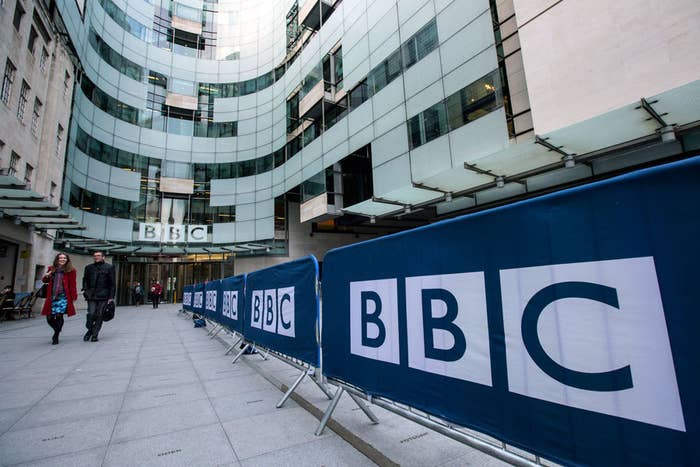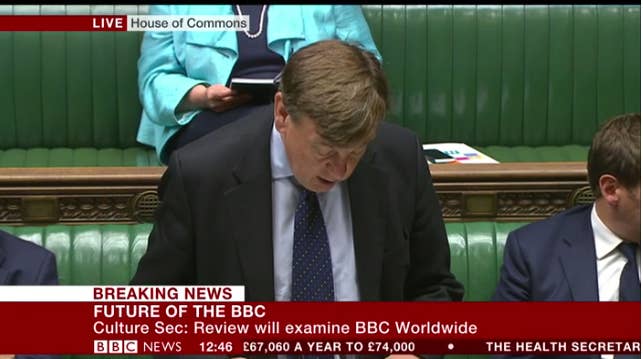The BBC could make everyone who uses the iPlayer catch-up service pay for a TV licence as part of a radical review of the way the national broadcaster operates that began today.

A review published by the government today makes clear its commitment to closing a loophole that allows people to watch catch-up services without paying.
"More people – especially younger people – now access television exclusively online and without a licence," it says. "This is perfectly legal, as the existing legislation was drawn up when the iPlayer did not even exist.
"The government has already committed to dealing with this problem and the charter review will allow us to look at how to modernise the current system."
Currently, a licence is only needed for watching live TV.
And the licence fee – the rule that means households that watch live TV need to pay £145.50 each annually – could be scrapped in favour of a subscription model that would potentially offer different levels of service for different prices.

Culture secretary John Whittingdale describing the licence fee as "regressive" but said the technology wasn't in place for subscriptions to happen in the short term.
"One key task is to ask whether the idea of universality still holds water," he said. "With so much more choice in what to consume and how to consume it, we must at least question whether the BBC should try to be all things to all people, or if it should have a more precisely targeted mission."
Whittingdale was officially kicking off a wholesale review on the scope and purpose of the BBC. This is the starting gun ahead of the renewal of the royal charter next year. The charter outlines the constitutional basis for the BBC and is updated every 10 years.
The upcoming review will "look at whether the scale and scope of the BBC is right and is what the public are willing to pay for," he said.
BBC supporters had feared that the government would announce that not paying the TV licence fee would no longer be a crime with the penalty of a fine – which could cost the BBC up to £200 million per year.
But Whittingdale said that a review had found that such move a would "not be appropriate" under the current funding model, adding that the issue would be looked at as part of the review.
The government released statistics today showing that huge numbers of people are prosecuted for non-payment – including 32 people who were jailed in 2013.
re: licence fee decriminalisation, in 2013 there were 178,332 prosecutions in England and Wales and 153,369 convictions. 32 imprisoned.
The review is part of a long-running drive by the Conservatives to redefine the BBC's role that will inevitably see the corporation shrink.
The BBC earlier this month agreed a deal with the chancellor, George Osborne, that secured the licence fee until at least 2020.
But in return, the BBC was forced to take on the £650 million cost of paying for free licence fees for people over-75s from the government – that's equivalent to about a fifth of the BBC's annual £3.7 billion budget. As part of that deal, the licence fee will increase in line with inflation.
However, Whittingdale said today that any inflation-linked rises are conditional on the BBC making further efficiency savings in line with other public bodies, and on the outcome of the charter review.
BBC director general Tony Hall announced a round of 1,000 job cuts this month to save £50 million. The corporation has already saved £1.5 billion from its total budget in recent years.
The review also says the government "will consider the full range of options for reforming the BBC's commercial operations", which could include the privatisation of BBC Worldwide, which makes millions of pounds by selling BBC shows and formats overseas.
Moves to curb the BBC’s size and influence in the UK and internationally have long been expected and look more likely under the first all-Conservative government.
Whittingdale this week announced an eight-strong steering committee of senior figures from the media world tasked with exploring various options ahead of the charter renewal.
Lord Patten, who stepped down as BBC chair in May last year due to ill health, told a House of Lords committee on Tuesday: "I wish I could feel a bit more confident about what is going to happen in future.
"The secretary of state has appointed a team of assistant gravediggers, presumably to help him to bury the BBC that we love. The only surprise is that ... Mr [Rupert] Murdoch is not actually on the committee. That would have made the future complete."
Shadow culture secretary Chris Bryant today called the BBC a "cultural NHS".
This week a host of BBC stars signed a letter calling on the prime minister not to cut back BBC funding.
I may be biased but the BBC is something we should be proud of and is well worth protecting. #backtheBBC http://t.co/EPI9Mdf0Cm
The BBC said in an emailed statement:
The BBC is a creative and economic powerhouse for Britain. The starting point for any debate should be: how can a strong BBC benefit Britain even more at home and abroad? The BBC has embraced change in the past and will continue to do so in the future, and we will set out our own proposals in September.
We believe that this Green Paper would appear to herald a much diminished, less popular, BBC. That would be bad for Britain and would not be the BBC that the public has known and loved for over 90 years.
It is important that we hear what the public want. It should be for the public to decide whether programmes like Strictly or Bake Off, or stations like Radio One or Two, should continue.
As the director-general said on Tuesday, the BBC is not owned by its staff or by politicians, it is owned by the public. They are our shareholders. They pay the licence fee. Their voice should be heard the loudest.
